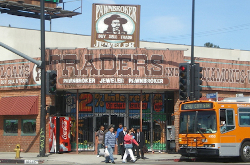전당포

Pawn shops are businesses where people bring their possessions to sell or to get a short-term loan. The United States has about ten thousand of them.
In the past few years, pawn shops have been doing business with more people than ever before. That is because many lenders now do business only with individuals having good credit ratings or a high-paying job. Often, the individuals most in need of a loan have poor credit ratings. But they do not need a good job or credit rating to get a loan from a pawnbroker. They only need something of value.
When a traditional lender approves a loan, it may be days or weeks before an individual receives the money. But pawnbrokers will give a loan in just a few minutes based on the resale value of an object and without asking about the person’s job or credit history.
Many pawn shops specialize in jewelry. But most shops accept almost anything of value, including computers, musical instruments, guns, old coins and other antiques. The item itself acts as the security, or collateral, for the loan. If the loan is not repaid, the object can be sold.
Customers can get the object back -- called redeeming it -- at any time by repaying the loan plus the interest and fees they agreed to pay. Or they can pay the interest and leave the item at the pawn shop for a while longer.
The National Pawnbrokers Association is a national trade group representing pawnbrokers. The association calls pawn-brokering “one of humankind’s oldest financial institutions.” It says pawnbrokers operated three thousand years ago in ancient China and in early Greek and Roman times.
Pawn shops may be large or small, clean or dirty, but they are all full of stories. This may explain the popularity of television shows like “Pawn Stars” on the History Channel. The show is about a family of pawnbrokers in Las Vegas, Nevada.
Another program, called “Hard Core Pawn,” is on the TruTV network. It shows a pawnbroker and his grown children in a large pawn shop in Detroit, Michigan. These programs are among the most-watched shows on the two cable stations.
Some pawnbrokers say the television shows have made people more willing to consider the idea of pawning their possessions. But others say the programs are misleading because they often show people selling things to the pawnbroker. Pawnbrokers say few people want to sell their belongings. In fact, they may need the item to pawn later. Pawnbrokers say they make more money loaning money than buying items and reselling them.
The National Pawnbrokers Association works to improve the image of the industry. It says pawnshops must follow many federal, state and local laws. The association gives training to its members on how to obey those rules, and urges pawnbrokers to do business in an honest way. It also works to establish good relationships with government and law enforcement officers.
Kevin Prochaska is head of the National Pawnbrokers Association. He owns thirteen pawn shops in Texas. Mr. Prochaska says sixty to seventy percent of his loans are on jewelry. He says it may seem like pawnbrokers make a lot of money, but they have a lot of costs.
“In my business, my typical stores, we make twenty loans a day, and like I said the average loan’s a hundred fifty dollars. So, you know the pawn service charge on that is, if everybody came and picked up their items, you’d get thirty dollars per hundred and fifty. And that seems like a big number. But when you’re doing thirty times twenty you’re bringing in six hundred dollars a day in revenue. You’ve got three or four people working there, you’ve got the rent, you’ve got the utilities.”
There are pawn shops in some wealthy areas in the United States. But such businesses are the exception. The fact is, most pawn shops are in poorer neighborhoods. Most people who pawn items do not earn a lot and have little money saved.
Not everyone believes pawnbrokers provide a good service. Critics have accused them of abusing the poor by charging high interest rates. But pawnbrokers say the high rates are the result of high business costs, including security and storage. And they say pawning an item may be less costly than losing electricity or heat.
Another criticism involves the custom of “low-balling.” This is telling an uninformed customer that an item is worth less than it really is. But the opposite also happens. Customers sometimes invent stories about items and claim they are worth more than they are. That is why pawnbrokers must know a lot about many different things. They have to estimate the age of an item, as well as whether it is valuable or worthless.

